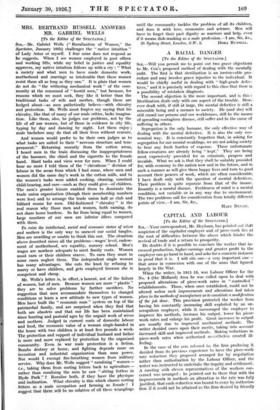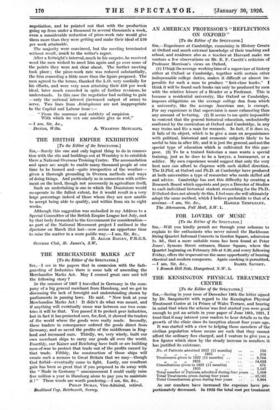CAPITAL AND LABOUR
[To the Editor of the SPECTATOR.] SIR,—Your correspondent, Mr. Heyburn, has pointed out that suspicion of the capitalist employer and of piece-work lies at the root of difficulties between the above which hinder the revival of trade and a return to prosperity.
He doubts if it is possible to convince the worker that in- creased production, higher earnings and greater profit to the employer can go hand in hand, and asks for a concrete instance in proof that it is. I will cite one—a very important one— that arose in connexion with one of the arms that figured largely in the War.
When the writer, in 1915-16, was Labour Officer for the
No. 4 (the Midland) Area he was called upon to deal with proposed alterations of piece-work rates in " controlled " establishments. These, when once established, could not be altered unless such improvements and alterations had taken place in the methods of manufacture as to constitute a modification of the job done. This provision protected the worker from having his constantly increasing skill exploited by an un- scrupulous employer, while it encouraged the employer to improve his methods, increase his output, lower his piece- work rates. and enlarge his profit. Great increases in output are usually due to improved mechanical methods. The writer. decided cases upon their merits, taking into account increased skill and improved methods. Making reductions in piece-work rates when authorized nevertheless created ill- feeling.
In the case of the arm referred to, the firm producing it decided from its previous experience to have, the piece-work rate reduction they proposed arranged for by negotiation rather than authorization by the Labour Officer, and the writer was instructed to undertake the inquiry and settlement. A meeting with eleven representatives of the workers con- cerned was arranged : he pointed out to these that with the improvements in methods an alteration in the rate was fullj justified, that such reduction was bound to come by authoriza- tion if it could ant be attained as the firm desired by friendly
negotiation, and he pointed *out that with the production going up from under a thousand to several thousands a Week, even a 'considerable reduction of piece-wcirk rate would give them More than they were getting and make their ideal of kit/ per week attainable.
The majority were convinced, but the meeting terminated without result, much tO the writer's regret.
After a fortnight's interval, much to his surprise, he received word the men wished to meet him again and go over some of the points they were not clear about. The further meeting took place ; the piece-work rate was reduced Substantially, the firm conceding a little More than the fignre proposed. The men agreed to the terms, thanked the L.O. very cordially for his efforts, and were very soon attaining their 110 per week ideal, later much exceeded in spite of further revisions, he Understands. In.-this ease the negotiator had nothing to gain .only the national interest. (increased output of arms) to -serve. TWO lines from Aristophanis are not inappropriate to the Capital and Labour issue :--
"From the mirrmur and subtlety of suspicion With which we Vex one another give us rest."
—I am, Sir, &c.,



















































 Previous page
Previous page